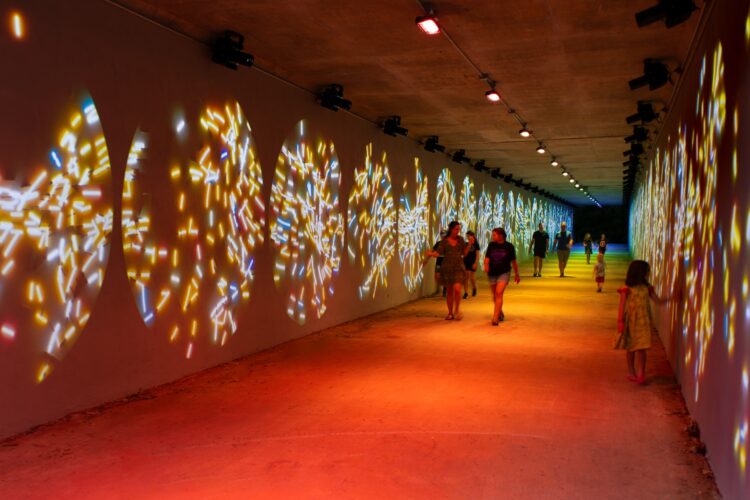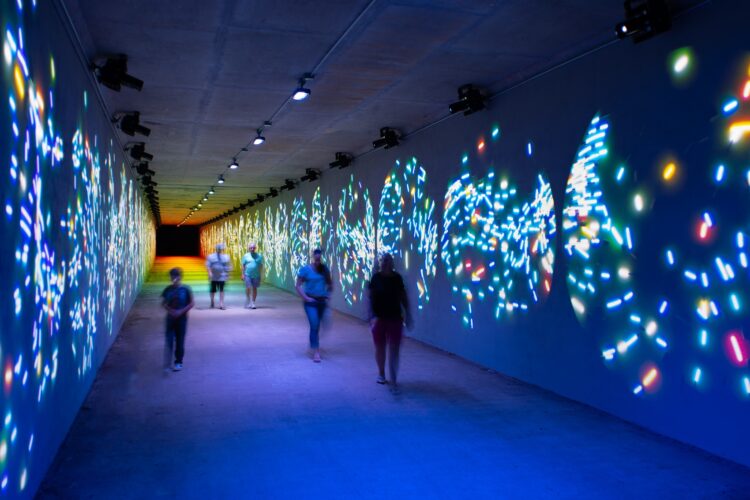Innovative work of art—and technology—brightens tunnel under I-77

‘State of Flow,’ created by Adam Buente of Project One Studio
July 10. By Page Leggett. How eager would you be to walk or bike through a 300-foot-long, 12-foot-tall, 16-foot-wide subterranean tunnel?
What if it were 30 feet below a busy stretch of interstate?
What one person may find exciting, another might find daunting.
Mecklenburg County Park and Recreation was faced with the challenge of making an underground tunnel feel hospitable. They turned to the Arts & Science Council (ASC) for help in finding the right artist to, as ASC Public Art Program Director Randella Davis said, “create functional art.”
“Park and Recreation needed to make a dark and dreary-looking tunnel light and welcoming,” she said. “The greenway is a huge asset to our region, and Park and Recreation, naturally, want to encourage use of it.”
Todd Stewart, ASC vice president for public art, added, “The artists were tasked with creating a more welcoming, safe, pedestrian experience.”
And the artist selected – Adam Buente, founder/owner of Project One Studio – “delivered an amazing artwork that addressed all the client’s needs in an exciting and creative way.

Buente | Photo: Project One Studio by Sara Michelle
Adam’s team excels at activating public spaces in innovative ways.”
Art and technology meet
Project One explores the idea of connection through technology, materiality and the human environment. Buente and team develop, build and install large-scale, site-specific private and public art commissions and custom architectural installations that invite people to explore the world around them.
The tunnel that’s now home to Project One’s latest creation is an innovative under-the-interstate passageway for pedestrians and cyclists to get from one side of I-77 to the other. Linking greenway segments on both sides of I-77, the tunnel is part of the NCDOT I-77 express lanes project near Exit 23 in Huntersville.
The interstate was previously a barrier to connectivity.
But the Torrence Creek Greenway, a 1.8-mile paved section of the Carolina Thread Trail, has aligned three continuous miles of existing trail and created a four-mile trail through woods and behind neighborhoods off Gilead Road.
The western section of the greenway runs through a meadow where deer are often spotted, and the eastern section passes by a large rock formation. Short sections of the greenway are boardwalks that meander through wetlands. It’s prime hiking and cycling territory.
A new ‘state’
Buente and his team – and their partners – were onsite with ASC staff last month, from June 15 through 20, for the installation.
Project One created a static light installation with custom, intricate patterns of color designed to encourage steady movement through the passageway. You’ll notice a rainbow of color reflected on the floor of the tunnel. Warm reds, oranges and yellows at one end gradually give way to cool blues and greens at the other.
Making use of steel, aluminum, flood lights and 48 projectors, the completed artwork, “State of Flow,” has increased visibility and improved pedestrian security, while meeting ADA accessibility requirements. (For instance, the lights are static rather than blinking, as that effect can trigger a seizure.)
“Project One was very accommodating,” Davis said. “They understood the mission, and they, too, want the greenway to be a frequently used resource.” With a project of this magnitude, there are always unexpected logistical challenges. In this case, the tunnel is in a drainage area.
“It will flood,” Davis said. And Project One had to take that into consideration.

‘State of Flow’ created by Adam Buente
‘Much like a stream’
In his artist statement, Buente wrote, “State of Flow … [captures] the essence of North Carolina’s ecology. From the initial design stages, one central theme emerged from the geography, history and culture of the Huntersville area: water.”
It “blends abstract representations of movement, liquidity and ephemerality with the region’s natural history, influenced by [its bodies of water]. The name also alludes to the mental flow state achieved during exercise, activities on the trail or appreciating the area’s natural beauty. In this state, time flows effortlessly, much like a stream …”
Clearly, Buente took inspiration from Huntersville’s rivers, streams and the massive, manmade Lake Norman that Mecklenburg County shares with Catawba, Iredell and Lincoln counties. The abstracted flowing lines you see on the walls of the tunnel are taken directly from maps of Lake Norman, Torrence Creek and McDowell Creek.
As part of the construction of the Cowans Ford Dam, Duke Power (today, Duke Energy) created Lake Norman, which is fed by the Catawba River, between 1959 and 1964. Many of the recreational opportunities and the overall prosperity of the area can be tied back to Lake Norman, the largest manmade body of fresh water in the state.
Davis, who saw the “before” and “after,” said “State of Flow” has completely transformed the tunnel. “It actually feels expansive,” she said of the space.
“This artwork exceeded the expectations of everyone involved,” Stewart said. “The end result truly looks like the renderings Project One provided three or four years ago.”
And it’s also made a potentially foreboding space bright and cheery. “State of Flow” is more than a connector; this tunnel may just become a destination.
About ASC
ASC is committed to equity and believes cultural programs should be accessible to all, build bridges across differences, and reflect our changing community. To achieve this, they invest in the people, organizations, programs, and ideas that move everyone toward a more equitable, sustainable, and innovative creative ecosystem. To give, click here.
—Page Leggett is a Charlotte-based freelance writer who covers arts and culture, travel, healthcare and other topics for local and regional organizations and publications.




